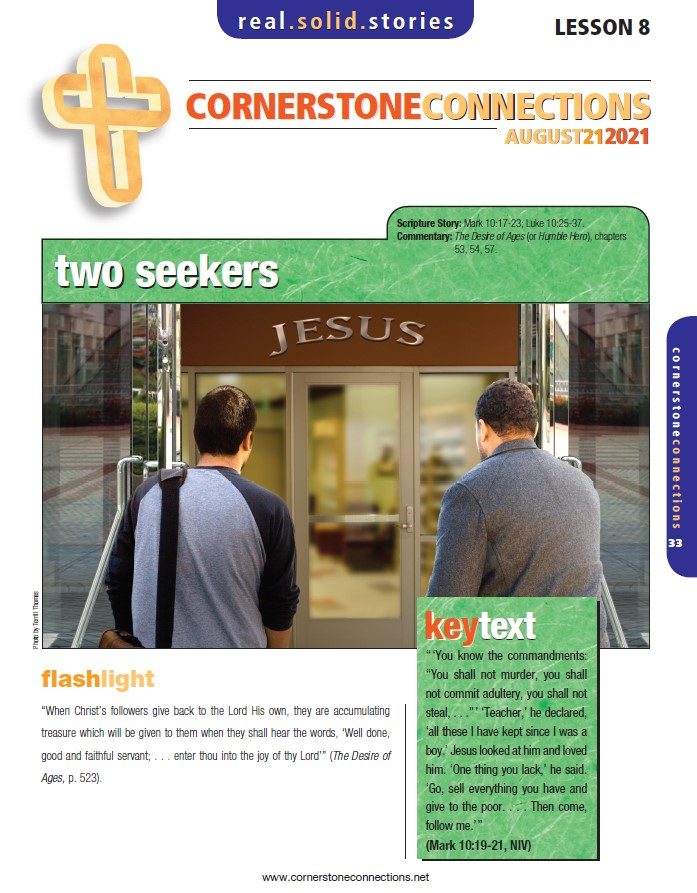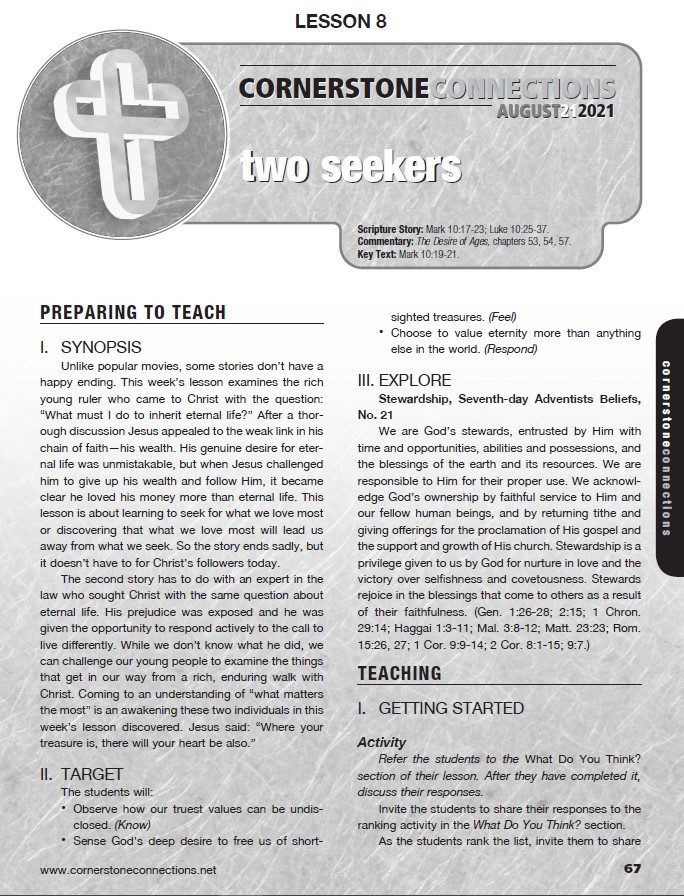Click below to download the Cornerstone Connections leader’s guide and student lesson. This week’s resources also include two lesson plans and a discussion starter video which offer different ways of looking at the topic. Each lesson plan includes opening activities, scripture passages, discussion questions, and real-life applications.
Humble Hero (Desire of Ages)
Chapter 53 - The Last Journey From Galilee

Humble Hero (Desire of Ages)
Chapter 54 - The Good Samaritan

Humble Hero (Desire of Ages)
Chapter 57 - The Rich Young Ruler Lacked One Thing

A seeker of eternal life leaves Jesus’ presence sad because he discovers that what he loves most is not what he is seeking. But our story doesn’t have to end that way!
SCRIPTURE PASSAGES
OVERVIEW
Have you ever wondered if being a lifetime member of the church gives someone a special pass to God’s kingdom? Our story today answers that question and more. Today’s story helps us see what it means to be a true follower of Jesus, not just a Jesus groupie.

OPENING ACTIVITY:
GUESS WHERE?
From which books of the Bible do the following stories come? (Look them up if nobody knows.)
QUESTIONS
TRANSITION
The Bible is full of interesting stories. God didn’t just remove Adam and Eve from the Garden of Eden and force them to figure life out on their own. Instead, He showed them how to live. Later, He gave them prophets and inspired writers who wrote down His instructions that are still available to us after a few thousand years. Scripture was written in such a way as to provide inspiration, illustration, and instruction on how to live. It is still just as important to our salvation as it was when it was first written down.

BIBLE STUDY GUIDE
Read Mark 10:17-23.
17 As Jesus started on his way, a man ran up to him and fell on his knees before him. “Good teacher,” he asked, “what must I do to inherit eternal life?”
18 “Why do you call me good?” Jesus answered. “No one is good—except God alone. 19 You know the commandments: ‘You shall not murder, you shall not commit adultery, you shall not steal, you shall not give false testimony, you shall not defraud, honor your father and mother.’”
20 “Teacher,” he declared, “all these I have kept since I was a boy.”
21 Jesus looked at him and loved him. “One thing you lack,” he said. “Go, sell everything you have and give to the poor, and you will have treasure in heaven. Then come, follow me.”
22 At this the man’s face fell. He went away sad, because he had great wealth.
23 Jesus looked around and said to his disciples, “How hard it is for the rich to enter the kingdom of God!”
QUESTIONS
Read Luke 10:25-27.
25 On one occasion an expert in the law stood up to test Jesus. “Teacher,” he asked, “what must I do to inherit eternal life?”
26 “What is written in the Law?” he replied. “How do you read it?”
27 He answered, “ ‘Love the Lord your God with all your heart and with all your soul and with all your strength and with all your mind’; and, ‘Love your neighbor as yourself.’”
QUESTIONS
Read John 13:34-35.
34 “A new command I give you: Love one another. As I have loved you, so you must love one another. 35 By this everyone will know that you are my disciples, if you love one another.”
QUESTIONS

APPLICATION
Jesus was radical. He loved people who society didn’t love. He shunned power and position. He told others that tradition wasn’t as important as principle. Have you ever wondered what Jesus would have to say about the church today? Would He be happy with what He sees? Would you be comfortable inviting Jesus to your church, school, or home? It’s important to compare your life to the principles that we find in Scripture. Don’t be discouraged if you don’t measure up, because you won’t, but what’s important is that you are listening to Jesus and allowing Him into your life to change it. The rich ruler’s mistake was that he wasn’t willing to change.
FOLLOW UP
Read Colossians 2:13-17.
13 When you were dead in your sins and in the uncircumcision of your flesh, God made you alive with Christ. He forgave us all our sins, 14 having canceled the charge of our legal indebtedness, which stood against us and condemned us; he has taken it away, nailing it to the cross. 15 And having disarmed the powers and authorities, he made a public spectacle of them, triumphing over them by the cross.
Freedom From Human Rules
16 Therefore do not let anyone judge you by what you eat or drink, or with regard to a religious festival, a New Moon celebration or a Sabbath day. 17 These are a shadow of the things that were to come; the reality, however, is found in Christ.
QUESTIONS

SCRIPTURE PASSAGES
LEADER’S NOTE
For a Relational Bible Study (RBS) you’ll want to get into the Scripture passage and encourage the youth to imagine participating in the story while it’s happening. Then you will be able to better apply it to your own situation today.
You will need to ask God for the Holy Spirit to be present as your small group discusses the questions (no more than 3-6 people in a group is recommended). Start with the opening question. It is a personal question and the answer is unique for each individual. There is no right answer and nobody is an expert here, so don’t be surprised when you hear different responses. You are depending on the Holy Spirit to be present and to speak through your group. Say what God prompts you to say, and listen to what others share.
Take turns reading the chapter out loud. Follow that with giving the students some time to individually mark their responses to the questions (a PDF version of the handout is available as a download). This gives each person a starting point for responding when you start to share as a group. Next, begin the discussion by asking the students to share what they marked and why on each question as you work your way through. Feel free to take more time on some questions than others as discussion warrants.
Encourage each person in the group to apply what is discussed to their personal lives and to share with the group what they believe God wants them to do. Then ask them to pray that God will help each of them to follow through in doing so. Remind them to expect that God will show them ways to live out the message of this passage in the coming week, and that they are free to ask others in the group to help hold them accountable.
Be sure everyone takes time for personal applications before you end your Sabbath School time together.
OVERVIEW
The story of the Good Samaritan is another parable that Jesus uses to show an inquisitive leader what exactly was wrong with the Jewish community. At the start of the story, we learn that the man asking these questions is by no means a stranger to the law; he is an expert by Jewish standards. The following onslaught of questions were merely a form to test Jesus, in an attempt to catch Him in an impossible dilemma and to call Him out. That is why Jesus did not straight out answer his question, and instead asked him what he understood from the law of Moses. After the man recited that law, Jesus encouraged him to follow it and he would attain eternal life. However, Jesus knew that this man, much like all the Jewish leaders and by extension the citizens, were not practicing this law. The man knew it too, and that is why he asked, “Who is my neighbor?” in an attempt to justify his actions.
The parable Jesus told not only focuses on helping someone incapacitated and showing compassion, which is the main lesson people take away from the story, but also in calling out the Jews’ hypocritical actions. It is important to note the placement of the characters in the story: the Rabbi and the Levite, two well respected members of the Jewish community, snub the dying man; the Samaritan, a man that the Jews considered less than or even hated, does good. In reality, many of the Jews, and especially their leaders, would have done exactly what the Rabbi and the Levite had done, even though the laws they themselves sought to follow said to do exactly the opposite. By forcing the man to answer his own question after the clear example in the parable, Jesus pointed out the man’s hypocrisy and unfair judgement of others in an inoffensive way.
A Good Samaritan
What is one instance that you feel as if you were able to help someone in a dire situation?
Read Luke 10:25-37.
25 On one occasion an expert in the law stood up to test Jesus. “Teacher,” he asked, “what must I do to inherit eternal life?”
26 “What is written in the Law?” he replied. “How do you read it?”
27 He answered, “ ‘Love the Lord your God with all your heart and with all your soul and with all your strength and with all your mind’; and, ‘Love your neighbor as yourself.’”
28 “You have answered correctly,” Jesus replied. “Do this and you will live.”
29 But he wanted to justify himself, so he asked Jesus, “And who is my neighbor?”
30 In reply Jesus said: “A man was going down from Jerusalem to Jericho, when he was attacked by robbers. They stripped him of his clothes, beat him and went away, leaving him half dead. 31 A priest happened to be going down the same road, and when he saw the man, he passed by on the other side. 32 So too, a Levite, when he came to the place and saw him, passed by on the other side. 33 But a Samaritan, as he traveled, came where the man was; and when he saw him, he took pity on him. 34 He went to him and bandaged his wounds, pouring on oil and wine. Then he put the man on his own donkey, brought him to an inn and took care of him. 35 The next day he took out two denarii and gave them to the innkeeper. ‘Look after him,’ he said, ‘and when I return, I will reimburse you for any extra expense you may have.’
36 “Which of these three do you think was a neighbor to the man who fell into the hands of robbers?”
37 The expert in the law replied, “The one who had mercy on him.”
Jesus told him, “Go and do likewise.”
SUMMARY
Jesus used the parable of the Good Samaritan to effectively skim through the traps the Jewish leaders had attempted to set for Him, while calling them out on their own hypocrisy. By this point in Jesus’ career, He was hounded by the Pharisees trying to plot His demise, yet Jesus managed to avoid the questioning and still provide a lesson for the crowd listening. This lesson still applies to youth today: practice what you preach and treat others with kindness and compassion. We cannot think ourselves better than others because we have the truth; instead, we must use opportunities such as the one of the Good Samaritan to show God’s love and minister to others through actions.

APPLICATIONS
So many aspects of the Good Samaritan story are relevant to modern life. It is always a necessary part of studying to sit back and meditate about how a story applies to us today as youth. Below you will find three applications that can benefit the youth in your group and help them meditate on the Word shared today. These applications work both individually and in a group.
As Christians, one of our main goals is to spread God’s love to the community. As a youth group, talk to your church leaders about how you can help serve the community around your church. Even as individuals, there is still a way to make an impact in your community! Take a few moments to brainstorm easy ways to make an impact through your day-to-day life.
Sometimes it is easy to read the Bible and come to church on Sabbath, but forget about everything you learn for the rest of the week. As a group or on your own, try to list some potential ways youth can divert in their daily lives from the teachings God has given. Say an extra prayer asking God to help you practice what you preach this week.
Jesus was asked difficult questions by Jewish leaders to try to trip Him up in His teaching of the Kingdom of God.




